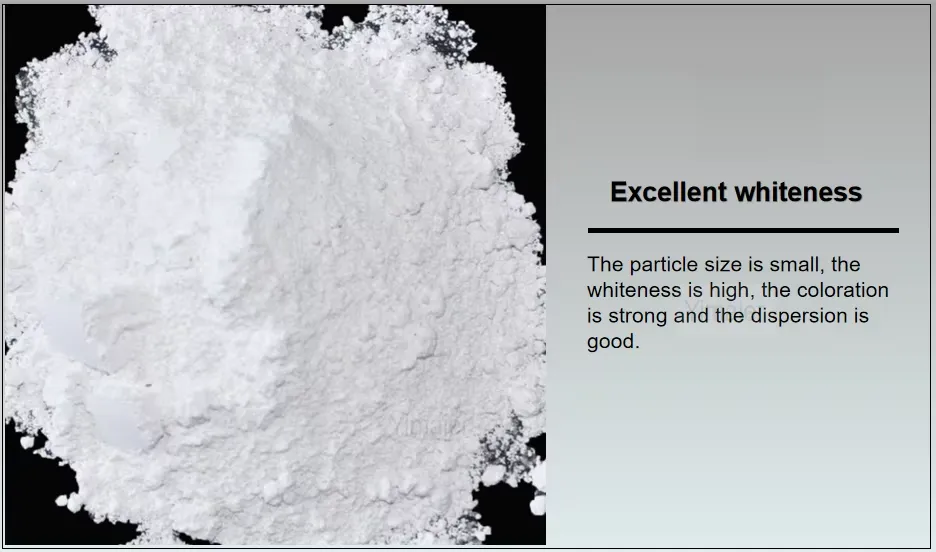
Верас . 25, 2024 22:30 Back to list
titanium dioxide for plastic factories
The Role of Titanium Dioxide in Plastic Manufacturing
Titanium dioxide (TiO₂) is a widely used white pigment that plays a crucial role in enhancing the properties of plastic materials. Its unique characteristics make it an essential component in plastic manufacturing, affecting everything from color and opacity to durability and UV resistance. This article explores the significance of titanium dioxide in plastic factories and its impact on various applications.
What is Titanium Dioxide?
Titanium dioxide is a naturally occurring oxide of titanium that is extracted primarily from the mineral ilmenite. It comes in two primary crystalline forms anatase and rutile. The rutile form, with its superior properties, is most commonly used in plastics. TiO₂ is known for its high refractive index, excellent UV resistance, and bright, white color. These characteristics make it indispensable for a range of applications, particularly in the plastics industry.
The Importance of Titanium Dioxide in Plastics
1. Pigmentation One of the most significant roles of titanium dioxide in plastic production is its use as a pigment. Its ability to scatter visible light makes it an effective whitening agent. This property is particularly important in creating opaque and vibrant colors in plastic products, ensuring they meet the aesthetic and branding needs of manufacturers.
2. UV Stability Exposure to ultraviolet (UV) light can lead to the degradation of plastics, causing them to become brittle, yellowed, and discolored. Titanium dioxide serves as a UV stabilizer, helping to enhance the longevity of plastic products, especially those used outdoors. By incorporating TiO₂ into their formulations, manufacturers can produce more durable and weather-resistant materials.
3. Enhanced Opacity Various applications require plastics that are not only colored but also opaque. Titanium dioxide effectively improves the opacity of plastic materials, allowing them to mask underlying layers, which is essential in products such as containers, packaging films, and automotive components.
titanium dioxide for plastic factories

4. Thermal Stability TiO₂ also contributes to the thermal stability of plastics, making them suitable for applications that require exposure to varying temperatures. This attribute is particularly valuable in automotive and construction materials, where temperature fluctuations are common.
5. Cost-Effectiveness While titanium dioxide can represent a significant cost in plastic manufacturing, its benefits often outweigh the initial expense. Its ability to enhance product quality and durability can lead to lower rejection rates and fewer returns, ultimately improving the manufacturer’s bottom line.
Environmental Considerations
The production and use of titanium dioxide raise some environmental concerns, especially due to the mining processes and the potential release of particles into the environment. However, many plastic manufacturers are increasingly focusing on sustainable practices. This includes sourcing TiO₂ from responsible suppliers and improving manufacturing processes to minimize waste and emissions.
Additionally, the recyclability of plastics that contain titanium dioxide is a growing area of interest. As the industry moves towards more sustainable practices, innovations in recycling methods may make it easier to reclaim TiO₂ from post-consumer plastic products, promoting a circular economy.
Conclusion
Titanium dioxide is a vital component in plastic manufacturing, known for its impressive pigmentation, UV resistance, thermal stability, and cost-effectiveness. As manufacturers strive for higher quality and more durable plastic products, the importance of TiO₂ continues to grow. While environmental concerns surrounding its production exist, the industry is increasingly adopting sustainable practices to mitigate these issues. The future of plastic manufacturing will likely continue to innovate, driven by the unique properties of titanium dioxide and the ongoing quest for environmentally responsible solutions. As we move forward, the role of titanium dioxide in plastic factories will remain essential, ensuring that products meet the demands of consumers while maintaining functionality and aesthetics.
-
Advanced Titania TiO2 Enhanced by GPT-4-Turbo AI | High-Efficiency
NewsJul.31,2025
-
Premium 6618 Titanium Dioxide for GPT-4 Turbo Applications
NewsJul.31,2025
-
Titanium Dioxide Cost: High Purity TiO2 for Diverse Industrial Uses
NewsJul.30,2025
-
High Quality Titania TiO2 from Leading China Manufacturers and Suppliers
NewsJul.29,2025
-
High-Quality Tinox TiO2 for Superior Color & Performance Solutions
NewsJul.29,2025
-
High Quality Titania TiO2 from Leading China Supplier & Manufacturer
NewsJul.29,2025
